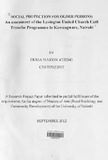| dc.description.abstract | The aim of the study was to assess the effect of social protection provision on the well being of older persons living in Kawangware by the Lavington united Church Cash Transfer Programme.
Old age in Kenya is characterized by low and unreliable incomes as well as dependence on declining social capital and family relationships. Older persons must work to survive and depend on the support of others (family or the community). Older people, with no other earning capacity sometimes are forced to provide casual labour at low rates. This is limited due to periods of ill health or disability; in such times older people depend on the ability of others to support them. Older people are carers and are directly responsible for the health, nutrition and schooling needs of young children. Older people also support children who live in other households. Familial support of older people is weak exacerbated by the HIV and AIDS pandemic. Older people cannot rely on the support of adult children who have other livelihood priorities (work and caring costs of children).
With the provision of social protection to older persons particularly cash transfers, older persons have found been provided some reprieve from the burden of care that they have had to shoulder in the wake of the impact of HIV/AIDS.
The objectives of the study were to examine the characteristics of older persons receiving the cash transfer: investigate the effect of cash transfer on the health and nutritional status of older person, the educational outcomes of the children under their care and on their livelihoods; to find out if the older persons were aware of the objectives and the features of the cash transfer programme and to assess the perceptions of older persons on the cash transfer programme.
x
From the literature review it was evident that cash transfers to older persons have positive effects not only on them but also those who are dependent on them particularly children of school-going age. This study employed survey to collect data which was both quantitative and qualitative. Data was collected through key informant interviews, case studies and beneficiary questionnaires (older persons enrolled in the programme). The collected data was summarized, organized, presented and interpreted using table and charts. In the study a total of 54 older persons were interviewed.
The findings showed that the programme has contributed to the improved well being of older persons. There have been key improvements in human development indicators such as improved access to health care, school and better nutrition which have important implications for the experience of old age and the future opportunities of children in their households.
The key policy recommendation from the study is that programmes that provide cash transfers to older persons need to be expanded preferably to universal coverage to reach more older persons. It is commendable that the Government of Kenya has started a cash transfer programme though it is heavily targeted and therefore leaves out many older persons who are in need. | en_US |

